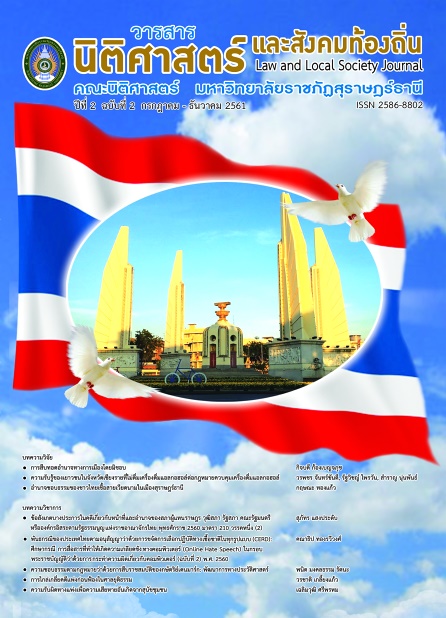พันธกรณีของประเทศไทยตามอนุสัญญาว่าด้วยการขจัดการเลือกปฏิบัติทางเชื้อชาติในทุกรูปแบบ (CERD): ศึกษากรณีการสื่อสารที่ทำให้เกิดความเกลียดชังทางคอมพิวเตอร์ (Online Hate Speech) ในกรอบพระราชบัญญัติว่าด้วยการกระทำความผิดเกี่ยวกับคอมพิวเตอร์ พ.ศ. 2560
คำสำคัญ:
การสื่อสารที่ทำให้เกิดความเกลียดชัง, พระราชบัญญัติว่าด้วยการกระทำความผิดเกี่ยวกับคอมพิวเตอร์, อนุสัญญาว่าด้วยการขจัดการเลือกปฏิบัติทางเชื้อชาติในทุกรูปแบบ, การไม่เลือกปฏิบัติบทคัดย่อ
คณะรัฐมนตรีมีมติให้ถอนข้อสงวนข้อบทที่ 4 ตามอนุสัญญา CERD เมื่อปี พ.ศ. 2559 ทำให้ไทยมีพันธกรณีตามกฎหมายระหว่างประเทศที่จะต้องวางกฎเกณฑ์ห้ามการ “โฆษณาชวนเชื่อหรือเผยแพร่แนวคิดที่สร้างความเกลียดชังด้านเชื้อชาติ” ซึ่งเป็นกรณีของ “Hate speech” ที่เกี่ยวข้องกับ “เหตุแห่งเชื้อชาติ” อย่างไรก็ตาม เมื่อพิจารณากฎหมายที่มีผลใช้บังคับอยู่ในปัจจุบัน พบว่า ไทยไม่มีกฎหมายที่เกี่ยวกับ “Hate speech” โดยเฉพาะ แต่มีกฎหมาย ที่อาจนำมาปรับใช้ได้หลายฉบับ โดยบทความนี้จะวิเคราะห์การปรับใช้ พระราชบัญญัติว่าด้วย การกระทำความผิดเกี่ยวกับคอมพิวเตอร์ (ฉบับที่ 2 ) พ.ศ. 2560 กับ “Hate speech” เฉพาะที่เกิดขึ้นทางระบบคอมพิวเตอร์ ซึ่งพบว่าความผิดเกี่ยวกับเนื้อหาตามมาตรา 14 และ 16 ตามพระราชบัญญัติฉบับดังกล่าวนั้น อาจนำมาปรับใช้กับ “Hate speech” ได้ในบางกรณีแต่ในบางกรณีก็ไม่สามารถนำมาปรับใช้ได้
อย่างไรก็ตาม จากการศึกษาเปรียบเทียบกฎหมายต่างประเทศที่เกี่ยวข้องแล้วพบกฎหมายเกี่ยวกับ “Hate speech” นั้น มิได้อยู่ในกฎหมายความผิดเกี่ยวกับคอมพิวเตอร์ แต่อยู่ในกรอบของกฎหมายอื่น โดยเฉพาะกฎหมายสิทธิมนุษยชน
ดังนั้น การปรับใช้กฎหมายความผิดเกี่ยวกับคอมพิวเตอร์ในกรณี “Hate speech” จึงไม่สอดคล้องกับหลักการสากลของ “Hate speech” ผู้เขียนจึงมีข้อเสนอแนะ ให้แก้ไขฐานความผิดเกี่ยวกับคอมพิวเตอร์ตามพระราชบัญญัติความผิดเกี่ยวกับคอมพิวเตอร์ (ฉบับที่ 2 ) พ.ศ. 2560 เพื่อมิให้ครอบคลุมไปถึงกรณี “Hate speech” และมีข้อเสนอให้ตรากฎหมายเกี่ยวกับ “Hate speech” โดยเฉพาะในกรอบของกฎหมายสิทธิมนุษยชน เพื่อให้สอดคล้องกับพันธกรณีตามอนุสัญญา CERD ต่อไป
เอกสารอ้างอิง
2. AlonHarel. (2012). Hate Speech and Comprehensive Forms of Life.In Michael Herz and Peter Molnar (Eds). The Content and Context of Hate Speech: Rethinking Regulation and Responses.Cambridge University .
3. Chaplinsky v. New Hampshire. 315 U.S. 568 (1942)
4. Convention on the Elimination of All Forms of Racial Discrimination (CERD). Article 1.
5. Convention on the Rights of Persons with Disabilities (CRPD). Article 2.
6. International Covenant on Civil and Political Rights (ICCPR). Article 2.
7. International Covenant on Economic, Social and Cultural Rights (ICESCR). Article 2.
8. International Convention on the Elimination of All Forms of Racial Discrimination. Article 4.
9. International Covenant on Civil and Political Rights, Article 19 and Article 20.
10. John C. Knechtle. (2006). When to Regulate Hate Speech. Penn St Law Review. 110.
11. Jones v. Toben. Racial Discrimination on the Internet. October 2002. Available from: https:// www.galexia.com/public/research/articles/research_articlesart22.html#fn357. Retrieved 29 August 2018.
12. Kanathip Thongraweewong. (2018, May-June). Legal limitations relating to the Application of Thai Computer–related Crime Act of B.E. 2560 to the case of “Phishing”. KasemBundit Journal. 19. pp. 100-111.)
Kanathip Thongraweewong. (2016). Laws relating to equality and non-discrimi Nation. Bangkok: National Human Rights Commission.
13. Kanathip Thongraweewong. (2012). Laws on Mass Media. Bangkok: Nititham.
14. Kanathip Thongraweewong. (2017). “Legal reform for compliance of article 4 of Convention on the Elimination of All Forms of Racial Discrimination in case of Hate Speech. Presentation in the Conference “Obligation of Thailand after withdrawal of article 4 of Convention on the Elimination of All Forms of Racial Discrimination”. Rights and Liberties Protection Department. Department of Justice.
15. Kanathip Thongraweewong. (2018). “The Application of the Computer Related Crime Act B.E. 2560 in case of defamation”. Proceedings of“the4th TECHCON 2018”. Bangkok: Siam Technology Colleague.
16. Kathleen E. Mahoney. (2009). Hate Speech: The Regulation of Hate Speech in a Democracy. Wake Forest Law Review. 44.
17. Pankaj P. Umbarkar. (2014, March). Free Speech and Hate Speech Syndrome: Unprincipled Animate in Media. Online International Interdisciplinary Research Journal. 4.
18. Pirongrong Ramasutra. (2015). Hate speech and online world. Bangkok. Kobfai.
19. Rachel Weintraub-Reiter. (1998). Hate Speech over the internet : A Traditional Constitutional Analysis or a new cyber constitution?. Boston University Public Interest Law Journal. 8.
20. Racial Discrimination Act 1975. 18C
21. Samuel Walker. (1994). Hate Speech: The History of an American Controversy. University of Nebraska. p. 9.
22. Sandra Coliver. (1992). Striking a Balance: Hate Speech, Freedom of Expression and non-discrimination. International Centre Against Censorship Human Rights Centre. University of Essex.
23. Susan Benesch. (2008). Vile Crime or Inalienable Rights: Defining Incitement to Genocide. Virginia Journal of International Law. 48.
24. Supreme Court Judgment 390/2545. Thai Bar Association.
25. Supreme Court Judgment 1513/2551.Thai Bar Association.
26. Supreme Court Judgment 1325/2498.Thai Bar Association.
27. Thailand Cabinet Resolution. 7 July, 2559. relating to the withdrawal of article 4 of Convention on the Elimination of All Forms of Racial Discrimination. The Secretariat of the Cabinet.
28. The Computer Related Crime Act B.E. 2550 as amended B.E. 2560
29. The Criminal Code
30. The Criminal Code. Section 319 (2).
31. United Nations Centre for Human Rights. (1991). Report of the Seminar on the Political, Historical, Economic, Social and Cultural Factors contributing to Racism, Racial Discrimination and Apartheid: Geneva, Switzerland. 10-14 December. 1990 (Research Report). New York: United Nations.
32. Warman v. Winnicki. (2006). CHRT 20
ดาวน์โหลด
เผยแพร่แล้ว
รูปแบบการอ้างอิง
ฉบับ
ประเภทบทความ
สัญญาอนุญาต
บทความที่ได้รับการตีพิมพ์ในวารสารนิติศาสตร์และสังคมท้องถิ่น คณะนิติศาสตร์ มหาวิทยาลัยราชภัฏสุราษฎร์ธานี ถือเป็นลิขสิทธิ์ของวารสาร ทั้งนี้ ข้อมูล เนื้อหา และข้อคิดเห็นที่ปรากฏในบทความเป็นความรับผิดชอบของผู้เขียนแต่เพียงผู้เดียว กองบรรณาธิการไม่มีความจำเป็นต้องเห็นด้วยหรือร่วมรับผิดชอบใด ๆ
เนื้อหา ข้อมูล รูปภาพ และองค์ประกอบอื่น ๆ ที่ได้รับการตีพิมพ์ในวารสารฯ อยู่ภายใต้ลิขสิทธิ์ของวารสารนิติศาสตร์และสังคมท้องถิ่น การนำไปเผยแพร่ ดัดแปลง หรือใช้ประโยชน์ในลักษณะใด ๆ ไม่ว่าเป็นบางส่วนหรือทั้งหมด ต้องได้รับอนุญาตเป็นลายลักษณ์อักษรจากวารสารก่อน


